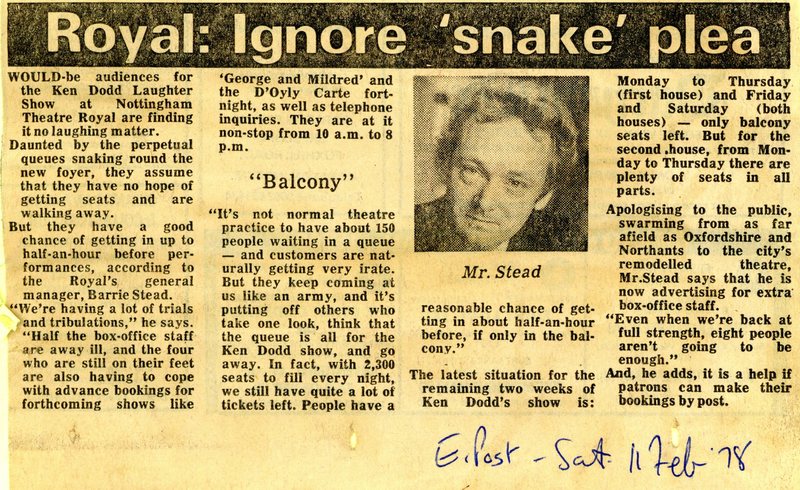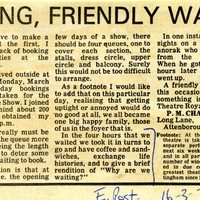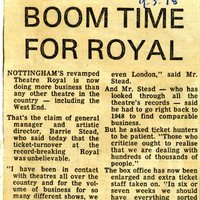Title
Long Queues at Refurbished Theatre Royal - Newspaper Cutting, 1978
Date
11 February 1978
Description
Nottingham Evening Post article about long box office queues at the newly-reopened Theatre Royal.
What's the story?
In the 1970s it was the vision of Nottingham City Council, under the leadership of Councillors Len Maynard and John Carroll, to create innovative and major changes to the Theatre Royal and its surrounding buildings.
With the idea of a Festival Hall complex, which would include a refurbished and modernised Theatre Royal, on the site of the now razed Empire Theatre on South Sherwood Street would stand a new Concert Hall.
In order to enable the Theatre Royal to accommodate new offices, dressing rooms and a large loading bay to enable large-scale work from visiting companies, it was also proposed that the Victorian built County Hotel, immediately adjacent to the Theatre Royal be purchased and demolished.
At a time of austerity in Britain, these proposals were controversial due to the large amounts of money to be spent on the project, as well as the demolition of the County Hotel, a much-loved building in the city.
These arguments spanned most of the 1970s, culminating in 1977/1978 when the Festival Hall plans were rejected, but councillors deciding to continue with the Theatre Royal modernisation.
This continuing drama, worthy of the Theatre Royal stage itself, was regularly played out in the pages of the Nottingham Evening Post, the local daily paper for the city and whose offices at the time were directly opposite the proposed Concert Hall site on Forman Street.
This article from February 1978 shows the popularity of the newly-reopened Theatre Royal and the demand for tickets for its new season. This resulted in long queues snaking around the foyers. A situation made even more difficult with half the box office staff off sick.
Barrie Stead, Theatre Royal Managing Director, states that the public “are coming at us like an army” and acknowledges they are having a lot of “trials and tribulations” and so is advertising for new staff to cope with the demand.
With customers desperate to spend their money at the venue, this is the kind of problem that all theatre managers would like to regularly experience.
With the idea of a Festival Hall complex, which would include a refurbished and modernised Theatre Royal, on the site of the now razed Empire Theatre on South Sherwood Street would stand a new Concert Hall.
In order to enable the Theatre Royal to accommodate new offices, dressing rooms and a large loading bay to enable large-scale work from visiting companies, it was also proposed that the Victorian built County Hotel, immediately adjacent to the Theatre Royal be purchased and demolished.
At a time of austerity in Britain, these proposals were controversial due to the large amounts of money to be spent on the project, as well as the demolition of the County Hotel, a much-loved building in the city.
These arguments spanned most of the 1970s, culminating in 1977/1978 when the Festival Hall plans were rejected, but councillors deciding to continue with the Theatre Royal modernisation.
This continuing drama, worthy of the Theatre Royal stage itself, was regularly played out in the pages of the Nottingham Evening Post, the local daily paper for the city and whose offices at the time were directly opposite the proposed Concert Hall site on Forman Street.
This article from February 1978 shows the popularity of the newly-reopened Theatre Royal and the demand for tickets for its new season. This resulted in long queues snaking around the foyers. A situation made even more difficult with half the box office staff off sick.
Barrie Stead, Theatre Royal Managing Director, states that the public “are coming at us like an army” and acknowledges they are having a lot of “trials and tribulations” and so is advertising for new staff to cope with the demand.
With customers desperate to spend their money at the venue, this is the kind of problem that all theatre managers would like to regularly experience.
Type
Newspaper Cutting
Location of item
Theatre Royal & Royal Concert Hall Nottingham
Rights
Theatre Royal & Royal Concert Hall Nottingham
Contributor
Researcher: David Longford



